Health and Safety Executive road safety statistics indicate that up to a third of all road traffic accidents involve someone who is at work*. Meanwhile, Stamp It Out reports that in 2023 a total of 2,307 road workers claimed to have been verbally or physically assaulted whilst working.
The data around the dangers faced by road workers is indeed sobering and paints a disturbing picture of an increasingly perilous working environment.
The mobile intelligent transport system (ITS) sector is working hard to develop new solutions to address this hugely challenging scenario by designing out risk. Traditionally, technology has focused on trying to prevent, monitor and record incursions and other incidents using electronic work zone protection barriers and CCTV cameras. But now a new generation of traffic signals are helping to promote road worker safety by minimising the amount of time they need to spend working in live traffic environments and exposed to the risk of accidents and roadside abuse.
Batteries are offering increasingly competitive run times, reducing the frequency of exchange and number of site visits required, while remotely operated solutions facilitate off-site operation. SRL recently launched REMOS, one of the first scalable remotely operated temporary signal solutions to enable off-site operation at multiple locations, including those in remote rural areas.
Some remote products allow one operative to manage several sites, monitoring traffic flows and efficiently making interventions to prevent and eliminate bottlenecks, not only minimising labour costs but also allowing reliable operation even in the face of the staff shortages that characterise the traffic management sector. In November, officials from Northern Ireland’s Department for Infrastructure reported that a lack of roadworkers is impeding the completion of road improvements across Belfast, with nearly a third of roles vacant.
Improving the environmental sustainability of our highways will doubtless be high on the agenda of secretary of state for transport, Heidi Alexander, as she prepares to draw up the country’s new Integrated Transport Strategy. By minimising the frequency of site visits required, the new remote signal solutions minimise too the carbon emissions associated with roadworker transport. Indeed, SRL estimates that the deployment of REMOS can save contractors in the region of 3,564kg CO2 per operative per annum no longer required on site. Some new signals are compatible with solar technology, harnessing renewable energy and limiting the carbon footprint of roadworks projects.
Constant technological innovation is indeed the defining feature of our sector. Rapid technological advances expand the potential of our products to facilitate highways that are increasingly safe – for road workers and road users alike – efficient and sustainable. Yet for the industry to truly embrace the potential of these new solutions, we need to take a more rigorous approach to quality standards to ensure that the traffic management products we use are of the highest possible quality.
TOPAS (Traffic Open Products and Specifications) provides local authorities and traffic management contractors with a straightforward system via which they may verify traffic control and associated equipment against a set of stringent quality criteria.
The specifications are intended to be used to aid purchasers and whilst not mandatory, the requirement for registration may be required by individual purchasing contracts. But while the majority of local authorities and traffic management companies stipulate TOPAS registration in the purchase of permanent ITS, many still fail to do so when hiring portable and temporary equipment, compromising the safety, sustainability and efficiency of our roads.
The industry must work together if we are to effectively harness the many opportunities presented to us by the rapid and ongoing technological evolution that defines the ITS sector, effectively embracing innovation in the quest for safer and more efficient highways. TOPAS product registration and procurement specification – in the hire as well as purchase markets – will help us to achieve this. SRL has recently become one of the first manufacturers to achieve the new TOPAS 2540A registration, with the launch of the UltraLight portable traffic signal incorporated in the REMOS signal solution.
*Health and Safety Executive
https://www.hse.gov.uk/roadsafety/




